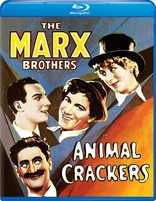Animal Crackers Blu-ray Movie
HomeAnimal Crackers Blu-ray Movie 
Universal Studios | 1930 | 99 min | Not rated | Nov 07, 2023Movie rating
7.2 | / 10 |
Blu-ray rating
| Users | 0.0 | |
| Reviewer | 4.0 | |
| Overall | 4.0 |
Overview
Animal Crackers (1930)
Mayhem and zaniness ensue when a valuable painting goes missing during a party in honor of famed African explorer Captain Spaulding.
Starring: The Marx Brothers, Groucho Marx, Harpo Marx, Chico Marx, Zeppo MarxDirector: Victor Heerman
| Comedy | Uncertain |
| Musical | Uncertain |
Specifications
Video
Video codec: MPEG-4 AVC
Video resolution: 1080p
Aspect ratio: 1.35:1
Original aspect ratio: 1.37:1
Audio
English: DTS-HD Master Audio 2.0
Subtitles
English SDH, French
Discs
Blu-ray Disc
Single disc (1 BD)
Playback
Region A (B, C untested)
Review
Rating summary
| Movie | 4.5 | |
| Video | 4.5 | |
| Audio | 3.0 | |
| Extras | 2.0 | |
| Overall | 4.0 |
Animal Crackers Blu-ray Movie Review
Reviewed by Jeffrey Kauffman October 16, 2016Note: This film is available as part of The Marx Brothers Silver Screen Collection.
The Marx Brothers remain one of the most iconic comedy teams in the entire history of show business, including of course their film work. Years of
vaudeville experience and then Broadway stardom meant the siblings came to cinema with personas largely set and with a huge “catalog” of bits they
could utilize for their film work. That said, the movie going public had never really seen anything like the manic proclivities of this familial troupe, and
countless commentators from 1929 (when The Cocoanuts debuted on celluloid) on have attempted to analyze various elements of the
team’s completely unique comedy. While perhaps not especially “meaningful” in any overarching way, I had an unusual response to watching these
new transfers of the first five Marx Brothers feature films (all reportedly sourced from new 4K restorations done by Universal), one probably sparked
by my recent reviewing duties.
Arrow Video’s UK branch recently released
Woody Allen: Six Films 1971-1978, and in doing some background reading in preparation for my reviews of the movies in that set,
more than once I read in various articles comments along the lines of “Allen helped to define Jewish humor” or “Jewish humor simply wouldn’t be
the
same without Allen.” Allen’s patented brand of neurosis, sexual obsession and verbal acuity may indeed be at least a trifecta of Jewish
humor if not the trifecta, but one only need look a bit further back in time to the Marx Brothers for another potent example of the
“mainstreaming” of elements that could well be considered Jewish humor. I'm not suggesting this is the only way to look at the Marx Brothers'
efforts, or even that it's an "important" way, just that it struck me as "being there" for me after having just watched a bunch of Allen films.
In a way, though, the Marx Brothers’ perceived “Jewishness” is a little
more subliminal than Allen’s is in his own films, though for those with the eyes to see, the siblings represent their generation of Jews rather
iconically.
Not only is their verbal humor full of puns and other formalistic hijinks, the very subject matter of many of their jokes tends to focus on social,
political and even economic elements. The very fact that the act is comprised of family is important, with a “me and you against the world”
ambience
that speaks to outcasts (obviously including Jews) to this day. But there’s a “subtext” to many of the early Marx Brothers films, where the
brothers
are the outsiders, virtual interlopers attempting to make sense of a calamitous “new” world, whether that be a hotel, high society, a passenger
ship,
college sports or even a supposed nation in the throes of financial ruin.
What’s fascinating about the early Marx Brothers efforts is how they very
subtly display signs of the assimilative fervor that many first or second generation Jews of that time period experienced, where it became
paramount
(no pun intended, considering the studio which released the early Marx Brothers efforts) to “blend in”. That may seem positively non-intuitive,
given
the Marx Brothers’ predilection toward anarchic behavior and just outright silliness, but when seen through the prism of an early to mid 20th
century
“Jewish identity,” the first five Marx Brothers feature films offer not just laughs galore, but a rather interesting example of so-called “ethnics”
rather
brilliantly invading the American consciousness in an almost subversive way. In this respect, the Marx Brothers become one of the most potent
examples
of what might be termed cultural immigration, where their Jewishness may have been slightly cloaked but no less ingratiating in the long run.
That
“cloaking” may be nowhere more obvious than in the persona of Chico, a Marx who spoke with a faux Italian accent and who seemed to be
something of a grifter at times. Cloaked in another way but perhaps arguably more ostensibly Jewish, at least on one interpretive level, was Harpo,
the weirdly childlike mute who seemed
to
often be the hapless scapegoat in many of the films, the outsider whose very powerlessness (as evidenced by his inability or unwillingness to
speak)
created “problems,” albeit often in a comedic way. The most obvious paradigm of Jewishness is of course Groucho, with his hyperarticulate
verbal
humor and a probably more than slightly lecherous mien which may in fact be a precursor for some of Woody Allen’s more sexually charged
material.
Zeppo, the kind of “forgotten” Marx Brother, and the one whose film persona is probably the blandest, may therefore somewhat ironically be seen as
the best symbol of those
aforementioned assimilative tendences—Zeppo had “learned” how to be an American first, blending in as the troupe’s straight man and therefore
almost seeming like an outsider himself, at least within the insular world of the siblings’ relationships.
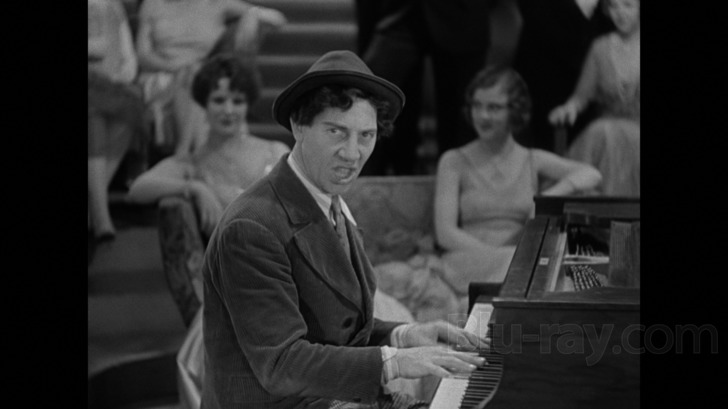
Maybe it’s because this film’s commentary features a man with a certain first name that the discrepancy early in the film between how Groucho’s character Captain Spaulding spells his first name is addressed in his analysis of the film. The character is listed as “Jeffrey” in the opening credits, but later a quick view of a newspaper article touting the explorer’s return spells it “Geoffrey”. As someone who has personally struggled with this issue for my entire life (and don’t even get me started on “Jeffery,” which was a popular spelling of the name in Utah, where I grew up), I am glad this extremely important issue was addressed head on by the commentary, and I can only state that it’s intuitively obvious what the correct spelling of Jeffrey is. (All of this is of course said with tongue planted firmly in cheek.) However you spell it, though, Animal Crackers remains one of the funniest Marx Brothers outings, one that provides Groucho with one of his trademark portrayals, as well as several of his most legendary lines.
Once again as with The Cocoanuts, the other film based upon a pre-existing Marx Brothers Broadway success (also written by Morrie Ryskind and George S. Kaufman), while there is a plot to Animal Crackers, it hardly matters. Aforementioned explorer Captain Spaulding (Groucho Marx) has returned from Africa to be feted at the mansion of society doyenne Mrs. Rittenhouse (Margaret Dumont). Also present at the party are Emmanuel Ravelli (Chico Marx), The Professor (Harpo Marx) and Horatio Jamison (Zeppo Marx), along with Mrs. Rittenhouse’s pretty daughter Arabella (Lillian Roth), and an officious man named Roscoe W. Chandler (Louis Sorin), who has eyes for Mrs. Rittenhouse. As a succession of at times patently surreal bits play out as vignettes, an overarching “mystery” ensues when a valuable painting at the Rittenhouse manse goes missing.
While not exactly “overt” in a traditional way, it’s interesting to note Groucho dropping the Yiddish term “schnorrer” during “Hooray for Captain Spaulding”, something that may give credence to my assertion above that there’s at least the potential for a Jewish subtext to be seen in some of the Marx’s material. In fact, commentator Jeffrey Vance refers to another analyst by positing that in this films the Marxes are “Jewish hustlers” attempting to infiltrate (ostensibly goyische) high society. While again viewing this film through this lens isn’t overly “meaningful”, it’s an interesting way to perhaps give a little sense to one of the siblings’ most delightfully insane and irrational cinematic gambols.
Animal Crackers Blu-ray Movie, Video Quality 
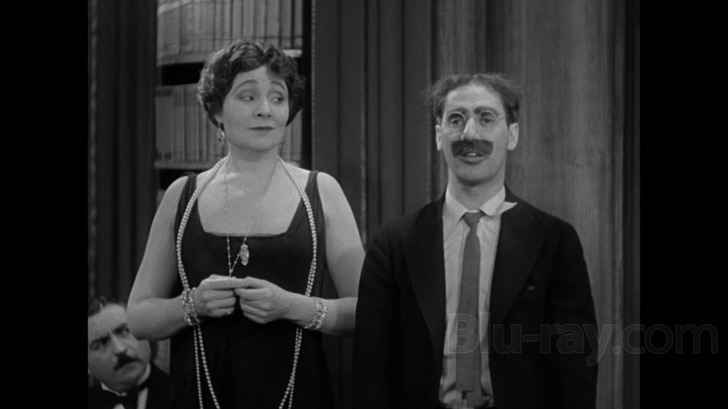
Animal Crackers is presented on Blu-ray courtesy of Universal Films with an AVC encoded 1080p transfer in 1.35:1. As Jeffrey Vance mentions in his commentary, this transfer was culled from a 4K scan of a duplicate negative held by the British Film Institute, one which was not hobbled by the cuts that American censors forced on the film with the rise of the so-called Motion Picture Code. That means that this is the first time the complete, unexpurgated Animal Crackers has been seen by (most) American viewers since the film's original release. The look here is miles better than The Cocoanuts, with a vastly improved level of homogeneity. In fact about the only outlier in this transfer is the final sequence, which looks just slightly brighter than the bulk of the presentation. Otherwise, this is virtually damage free, other than extremely small age related items, and contrast and black levels are consistent throughout. Detail levels are very good, though again (as with The Cocoanuts) close-ups are in relatively short supply, meaning fine detail never really gets the opportunity to "pop". The dark sequence later in the film offers virtually no detail levels at all, some of which is certainly by design. There are occasional slight density fluctuations which can give rise to a kind of quasi-flicker at times. My score is 4.25.
Animal Crackers Blu-ray Movie, Audio Quality 
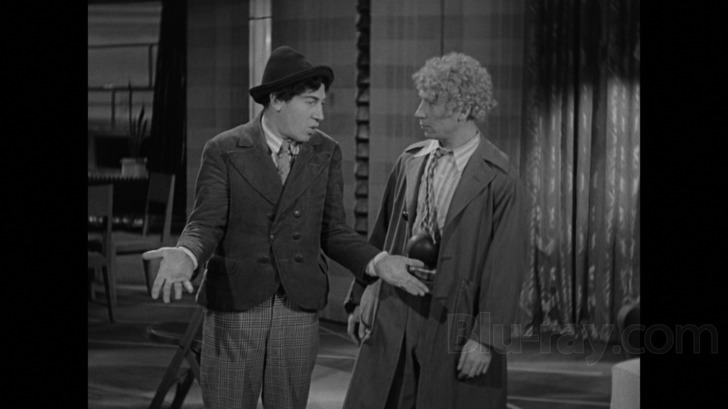
The first two Marx Brothers films were shot on the east coast at what is now the Kaufman Astoria studios, and as the commentaries on a couple of these features mention, the sound quality of both The Cocoanuts and Animal Crackers has always been substandard, especially when compared to the later, Hollywood shot, films. While Animal Crackers' DTS-HD Master Audio 2.0 mono track is a bit less problematic than The Cocoanuts, with less overwhelming hiss and fewer signs of age related wear and tear like pops and cracks, the overall sound quality is still rather boxy and even muffled sounding at times. Dialogue comes through clearly enough, and while the musical elements aren't especially full sounding, there are no overly distracting issues like distortion. My score is 3.25.
Animal Crackers Blu-ray Movie, Special Features and Extras 
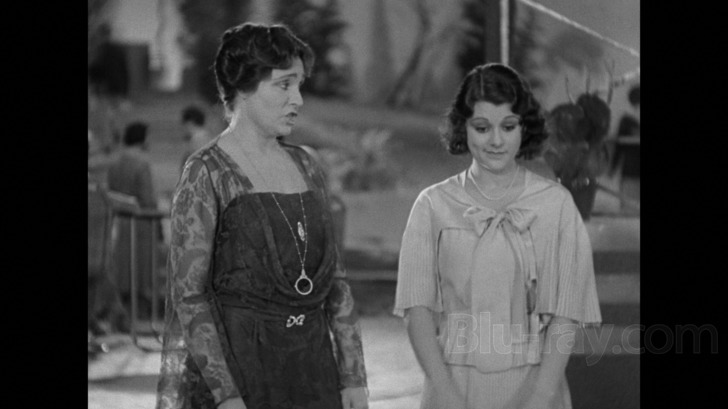
- Feature Commentary with Film Historian Jeffrey Vance. Vance gets into the really important data like how to spell "Jeffrey", while also touching on a host of obviously less important material like the cuts that were made to appease the Hays Office, and sidebars like Groucho's appreciation of Margaret Dumont.
Animal Crackers Blu-ray Movie, Overall Score and Recommendation 
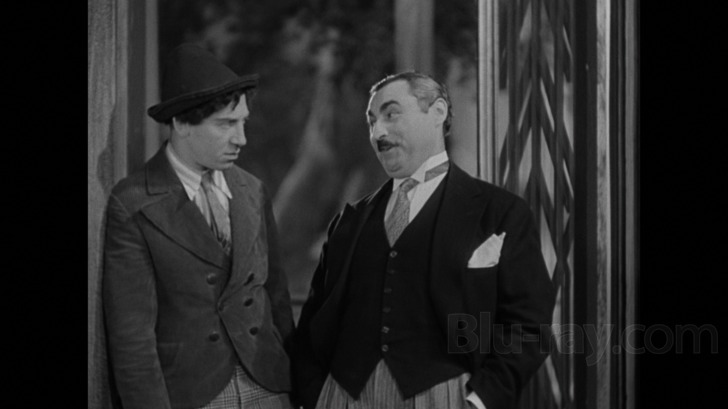
Fans of Animal Crackers will no doubt delight in the fact that this is finally the complete, unexpurgated version. The film has a number of fantastic gags and is one of the more consistently hilarious of the Paramount films. Video is excellent and audio good on this release, which comes Highly recommended.
Similar titles
Similar titles you might also like

Horse Feathers
1932

Monkey Business
1931

The Cocoanuts
1929

Duck Soup
1933

Mon Oncle
My Uncle / French and English Versions
1958

Trafic
Traffic
1971

Ishtar
Director's Cut
1987

PlayTime
4K Restoration
1967

Goin' to Town
1935

À Nous la Liberté
1931

Buster Keaton: The Shorts Collection 1917-1923
1917-1923

King of Jazz
1930

Everything You Always Wanted to Know About Sex *But Were Afraid to Ask
1972

Champagne
1928

Klondike Annie
1936

The Girl Can't Help It
1956

La chanson d'une nuit
1933

Belle of the Nineties
1934

True Stories
1986

Peek-a-Boo
1953
